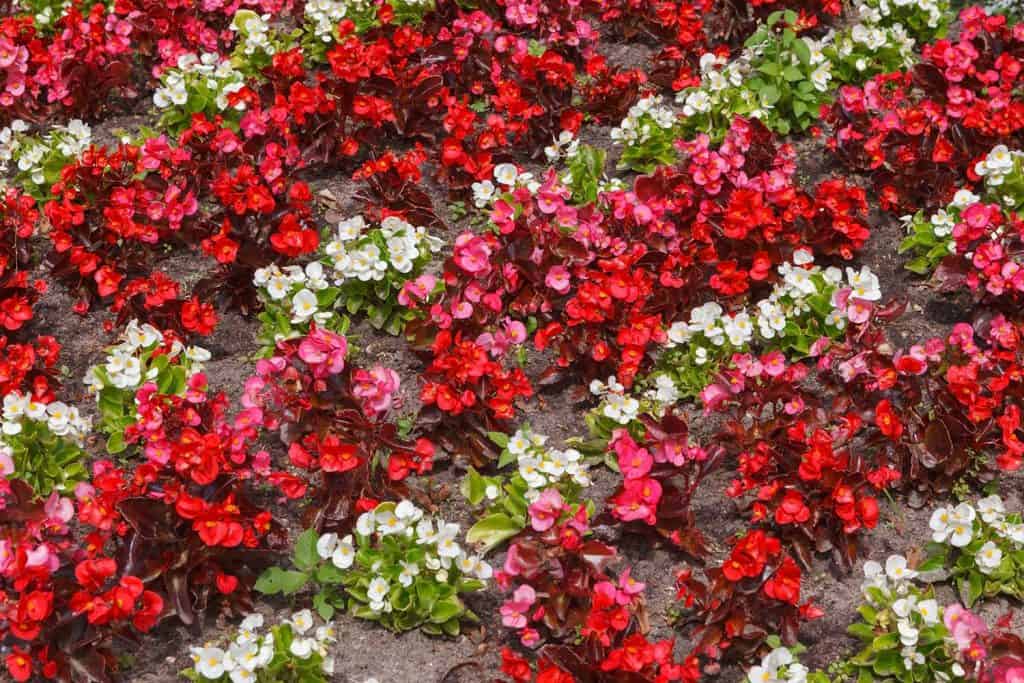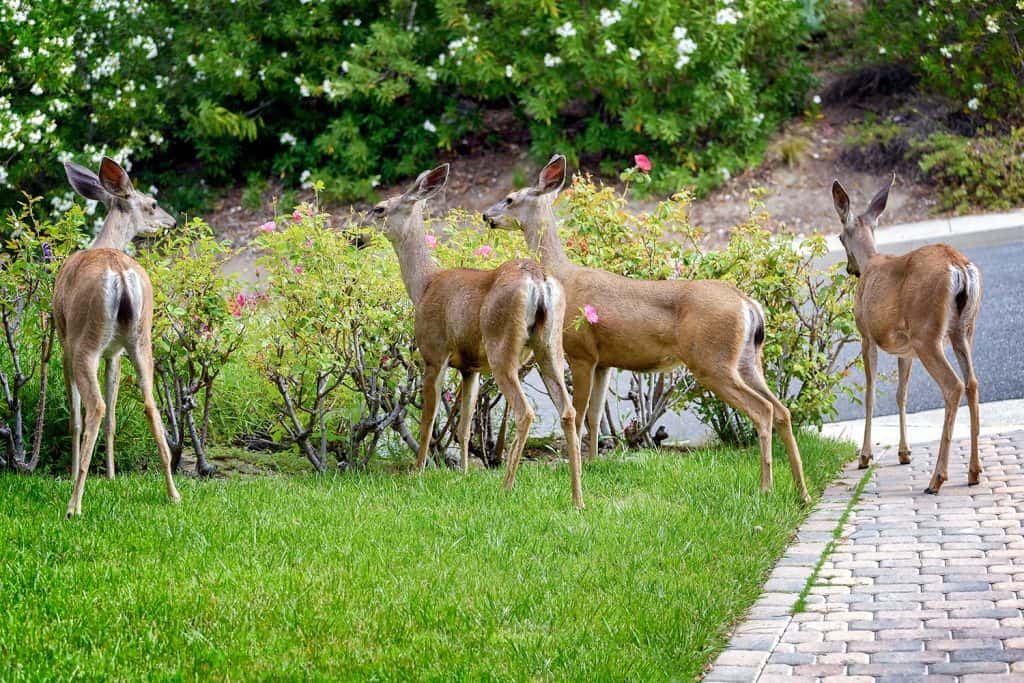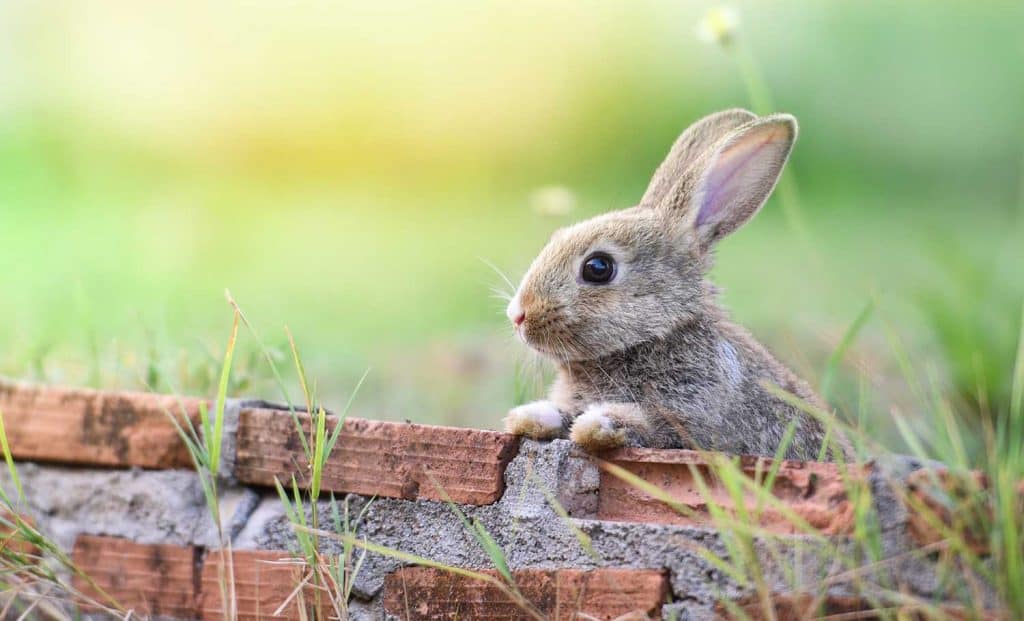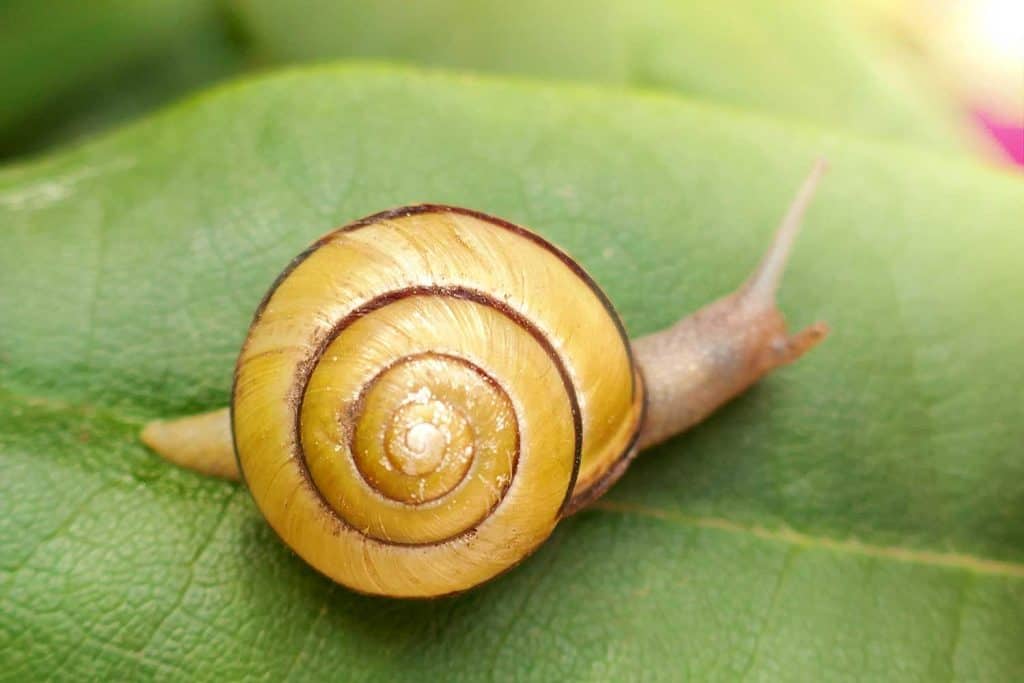If you are going to add begonias to your garden, it is essential to know: do deer eat them? The answer to this question will go a long way in helping you ensure that the flowers you plant have the absolute best chance for success. We've done the research to answer this question so that you will know the best ways to protect your begonias.
Begonias are not deer's first food choice. However, deer may eat them when it is convenient or if they are hungry enough. The best way to protect deer from begonias is to incorporate a variety of strategies, including:
- Repellent
- Fencing
- Filling your garden with flowers and bushes that deer do not like to eat
- Planting your begonias close to your house
![Garden of begonias with majestic red deer, Do Deer Eat Begonias? [Inc. 4 Ways to Protect Your Flowers]](https://gardentabs.com/wp-content/uploads/2020/08/Do-Deer-Eat-Begonias.jpg)
Deer are not the only potential animal threat to your begonias, though. Keep reading to find out not only how to protect them from deer, but to learn about these other creatures and how to protect your flowers from them, too.
Begonias Are Not A Deer's Favorite Food
Deer, especially hungry deer, can be indiscriminate eaters. While begonias may not be their primary menu item, they will consume them if necessary. This is true of basically any plant, which is why it is impossible to call any flower deer-proof. Begonias, while deer resistant, are not immune to deer's appetite.

Protecting Your Begonias From Deer
Since you can't guarantee that deer will refrain from eating your begonias, what can you do to protect them best?
Deer Repellant
One of the first things you can try is deer repellent. There are several options available to purchase online, or you can make your own. Whichever you choose, remember that it is essential to reapply them regularly. They can be rinsed off by rain, and they do not last indefinitely.
Fencing
Another option to protect your begonias from deer is to install a fence around them. Your fence must be at least 6 to 8 feet high as deer are excellent jumpers, and a meal is a great motivator! However, one major drawback of fences is the fact that people will not be able to see the flowers you have planted easily.
Other Plants and Flowers That Deer Do Not Like
A natural way to protect your begonias is to surround them with other plants and flowers that deer do not like. These include poppies, daffodils, and more. Making your garden as uninviting as possible is a great way to deter deer from ever even entering it. If your garden is full of flowers that deer don't want to eat, they're more likely to avoid it altogether.
Plant Close to Home
Finally, plant your begonias close to your house. This will enable you to see any potential deer activity and give you the chance to scare them away. Your dog might also be able to help you protect your begonias. If the family dog sees deer outside, their bark will likely frighten the animals away.
Using more than one of these steps will increase the likelihood of success. Changing your strategies regularly will also help. Deer will grow bolder over time, and keeping them on their toes is another way you can protect your begonias.

Do Rabbits Eat Begonias? [And How To Prevent This]
Deer are not the only animals that may eat begonias. Rabbits, like deer, will eat begonias, though they too do not seek them out. Wax begonias, in particular, do not seem to be a rabbit's favorite meal. However, in the same way that not every person eats the same diet, some rabbits will eat begonias.
The steps to protect your begonias from rabbits are very similar to the strategy required to protect them from deer. Planting begonias among other flowers that rabbits do not enjoy eating is an excellent way to prevent the pests from feasting on them.
Along with planting begonias among other plants that rabbits don't like, you can try keeping space between your plants. Since rabbits are prey animals, they must be exceptionally cautious. Gardens that have flowers and plants that are spread out will limit the amount of cover available to them. Rabbits will stick close to cover whenever possible, so keeping room between the plants can prevent rabbits from entering.
Fencing is another option, but the type of fencing you choose is essential. Traditional chain link or picket fencing will not be useful since rabbits can fit through small spaces. You'll need a wire or mesh fence that will not allow them to slip through. Unfortunately, this type of fencing is not aesthetically pleasing.
An outdoor cat or dog can also be an effective way to protect your begonias. At the very least, a cat or dog can chase away a rabbit. In some cases, your dog or cat may catch the rabbit and solve the problem for you.
Finally, repellent is another potential solution. As with deer repellent, remember to reapply with relative frequency to see the best results. If you fail to reapply, you will not see as much benefit.

What Other Animals Eat Begonias? [And How To Prevent This]
Now that we know that deer and rabbits will eat begonias (though they are not their first choice), we need to know what else may eat them. Interestingly, the main threat to begonias are not large animals, but small ones -- mainly insects. These tiny creatures can do extraordinary amounts of damage to them, too.
Aphids are one of the begonia's primary enemies. These insects will damage the flowers by eating the stems and leaves, which can lead to significant problems for the begonias, including death. The good news is that regular watering can help control aphids. If there are a lot of them feeding on your plants, you can also use an insecticidal soap.
Snails and slugs also eat begonias. Typically, they will feed at night. They will leave signs of destruction on the leaves of the plant. Use slug and snail bait to eliminate these pests.
Some additional insects and pests eat begonias. They include whiteflies, mealybugs, caterpillars, and earwigs, to name a few. Most of the insects can be controlled with the same type of insecticidal soap used against aphids. Caterpillars can simply be removed by hand and placed far from your flowers. Use the same bait for earwigs that you use against snails and slugs.

What We Have Learned
Keeping deer and other animals away from your begonias requires some effort, but these beautiful flowers are undoubtedly worth it. We've put this piece together to help you learn and implement the necessary steps to protect them. Now that you've read it, we hope you feel more confident and more prepared to defend your begonias from the animals and insects that may try to feast on them.
For more information about plants that deer like to eat and how to protect those plants from them, check out these posts:
Do Deer Eat Petunias [And How To Stop Them From Doing That]
Do Deer Eat Impatiens [And How To Protect Your Impatiens From Them]
